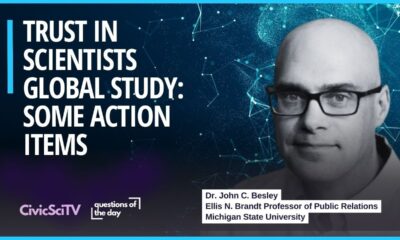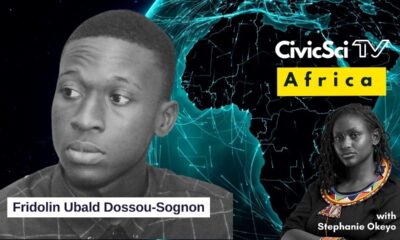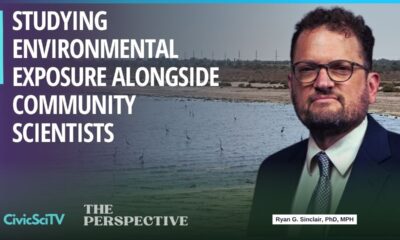Stories in Science Special Series
I always thought I wanted to be a scientist

– Michelle Dookwah –
Graduate Research Assistant at the University of Georgia
[dropcap]I[/dropcap] always thought I wanted to be a scientist, yet I considered other careers at brief points in my life. When I was really young, I wanted to become the Pope because I envied his awesome hat. Why else? Then, in my early teens I thought about becoming a lawyer. Yup! A lawyer! Why? Well, I wanted to be a lawyer because I loved arguing with anyone and everyone. However, for the most part, I wanted to become a scientist.
My father always supported my decision to pursue higher education in the sciences. He himself is a veterinarian, and a former researcher. My father was also a realist. He explained that it wouldn’t be easy, and I would face many obstacles along the way 
During undergrad, I worked on a project in a research lab at the Yale Medical School studying cancer. My mentor was a woman who held both an MD and a PhD. I was really inspired by her ability to balance running a lab, seeing patients, and even starting a business; all while raising a family! After working in her lab and completing my bachelor’s degree in science, I decided to go to graduate school. At the time, I thought I wanted to pursue a career in scientific research and more specifically, cancer research.
Don’t get me wrong; I am still very passionate about scientific research! However, while I always thought I wanted be a scientist and pursue a career in scientific research, I’m now starting to rethink things.
I started graduate school at the University of Georgia back in my hometown of Athens, Georgia. I came across a lab in the Complex Carbohydrate Research Center, or CCRC, that studied the utilization of complex sugars to identify cancer cells. I rotated through this particular lab at the start of my PhD. You may hear “sugars” and “carbohydrates” and automatically think I spent my days studying food. I’d have to admit, before coming to graduate school, the only complex carbohydrates I gave any thought to were white bread versus wheat. However, what you probably do not realize is the fact that all living cells are actually decorated on the surface with a variety of complex carbohydrates, or sugars, also known as glycans. 
A special part of my project is that I use stem cells to study, or model, these diseases. Stem cells are a special type of cell that can actually turn into any other type of cell in the human body! The really cool part is that by using cutting edge technology, termed “reprogramming,” we can actually take cells from a patient and turn them into a type of stem cell that can then go on to become any other type of cell we need! For my project, we need to study brain cells, or neurons, but it is very difficult to obtain neurons from a living patient. Instead, we can take skin cells from the patient and reprogram them into stem cells, which can then become neurons. The technology is fascinating and has the potential to revolutionize scientific research and medicine! With this technology we can study a whole host of neurological disorders including Alzheimer’s Disease and Autism Spectrum Disorders (ASDs). My project focuses on a disease that you have probably never heard of called Salt and Pepper Syndrome. These patients have spotted skin; hence the name, but they also have a whole variety of other, much more severe neurological symptoms, such as seizures and intellectual disability. The disease is caused by the lack of a specific enzyme, or type of protein, that puts a special sugar on the cell surface. We currently don’t know why a lack of this particular sugar causes such severe problems with the brain. But we have reprogrammed stem cells from a patient that we can turn into neurons to hopefully understand the disease better.
Studying complex carbohydrates and working on this project have had a real effect on my overall views on scientific research and being a scientist. Don’t get me wrong; I am still very passionate about scientific research! However, while I always thought I wanted be a scientist and pursue a career in scientific research, I’m now starting to rethink things. I have learned a lot about the importance of basic research and the significance and impact of studying rare diseases. Switching from cancer research to a project on a disease no one has heard about really opened my eyes to the importance of effective science communication and has taught me the powerful influence sharing scientific research can have in society. Strongly in part because of my thesis project, I’m now interested in pursuing a career in science communications or policy. Ultimately, I would like to be able to provide patients and individuals outside of the science community with a better understanding of the research, tools and technology – like the stem cells in my project – that can make a huge difference in their lives.
Featured Image is by Dennis Meene and is titled “What I Dreamed Of” from Flickr| Some rights reserved
Read Michelle’s Blog HERE
The CS Media Lab is a Boston-anchored civic science news collective with local, national and global coverage on TV, digital print, and radio through CivicSciTV, CivicSciTimes, and CivicSciRadio. Programs include Questions of the Day, Changemakers, QuickTake, Consider This Next, Stories in Science, Sai Resident Collective and more.

-
 Audio Studio1 month ago
Audio Studio1 month ago“Reading it opened up a whole new world.” Kim Steele on building her company ‘Documentaries Don’t Work’
-
Civic Science Observer1 week ago
‘Science policy’ Google searches spiked in 2025. What does that mean?
-
Civic Science Observer1 month ago
Our developing civic science photojournalism experiment: Photos from 2025
-
Civic Science Observer1 month ago
Together again: Day 1 of the 2025 ASTC conference in black and white
Contact
Menu
Designed with WordPress
























